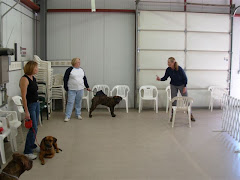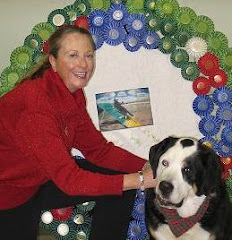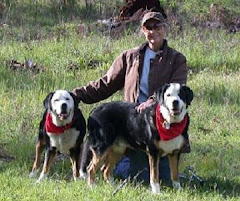The miniature Schnauzer spent most of the evening clinging to her adopted mommy's neck, afraid to even look at anything else around her. When Mommy finally put her down on the floor, the nervous Schnauzer promptly ran over to a dog bed across the room and pooped on it. When another dog came up her her, she peed. Mommy picked her up, cuddled her, and then put her in the car.
The rescued Aussie was a basket of raw nerves all night, since he's almost never allowed to interact normally with other dogs, other than the old one he lives with. He went after the schnauzer a couple times in a much-too-forward way, and promptly got reprimanded by HIS mom. But the "reprimand" was more of an "It's okay, boy, it's okay, just relax and be nice," which the dog did NOT interpret as a reprimand.
These two dogs were overprotected by moms who could not forget these dogs' difficult pasts. The schnauzer had spent most of her life having puppies in a cage. The Aussie had been deprived of the human nurturing he needed. Both the adopted moms were trying to make it up to the dogs now. Several times during the evening, the moms related snippets of their rescued dogs' former lives. It was obvious that the moms were dwelling not on the dogs' present lives, but on their past lives.
Ironically, the "past" is not even remembered by these dogs. The dogs live in the present--the here and now. It is only we humans who dwell on the past and worry about the future, frequently at the expense of forgetting to live in the present!
By worrying about these dogs' past lives...by nurturing their fears and coddling their insecurities, by making decisions about them based on their past...these moms are retarding the social and emotional growth of their dogs. The best thing for the timid schnauzer would be to spend supervised time on the floor, on a leash, without a lot of verbal influence from Mom. The best thing for the aggressive Aussie would be to turn him loose with a bunch of other dogs and let him interact in natural way with the other dogs. In a matter of minutes, the schnauzer would be over her timidness, and the Aussie would learn who he could and couldn't herd. Instead, the owners want to take their time. Six months from now, they'll be saying something like, "Well, she's getting a lot better..." Hmmm. That certainly is the slow way to a destination.
These rescued dogs remind me of the problem we have with non-English-speaking immigrants. Rather than immerse these folks into our culture and language, we coddle them by offering them bilingual education, bilingual supermarket signs, bilingual doctors and bankers. Make the transition "easy" for them. Some day, maybe, they'll learn to assimilate into the U.S. culture and learn to speak English...maybe...but in the meantime, we'll make it exceedingly easy for them to NOT have to learn the language.
My fraternal grandparents immigrated from Norway in the early 1900s. They spoke no English....for a few weeks. They forced themselves to learn the language in short order, and forbid their own children from speaking Norwegian in their home! They did this for the good of their children!!
Dogs and people are both equipped with the ability to transition and adapt, and to do it quickly. This is one of the laws of Survival. Adapt to changing conditions in the pack. Life doesn't stop or even wait for those who want to take their time dwelling on the past or on the way things "used to be."
The best thing you can do for a rescued dog is to treat him like he's always been a member of your family. The best thing you can do for a non-speaking immigrant is to treat him like an AMERICAN.


















No comments:
Post a Comment